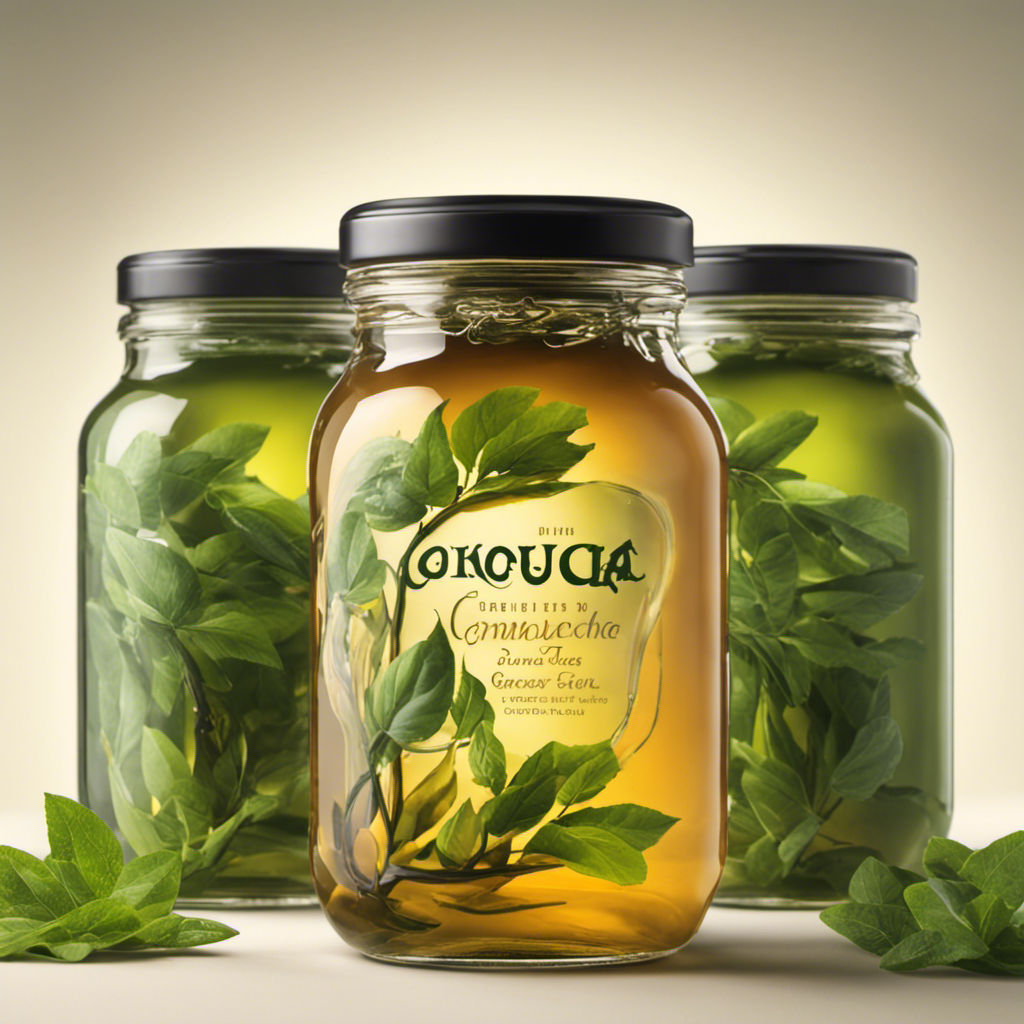Coffee Alternatives And Tea
Master the Art of Creating Healthy Weight Loss Iced Tea


Master the Art of Creating Healthy Weight Loss Iced Tea
As a tea lover and weight loss enthusiast, I have discovered the secret to creating delicious and healthy iced tea that helps shed those unwanted pounds.
In this article, I will share with you my tried and true methods for mastering the art of making weight loss iced tea.
From selecting the perfect tea type to incorporating healthier sweeteners and adding fresh fruits, you’ll learn how to create a refreshing drink that not only quenches your thirst but also supports your weight loss goals.
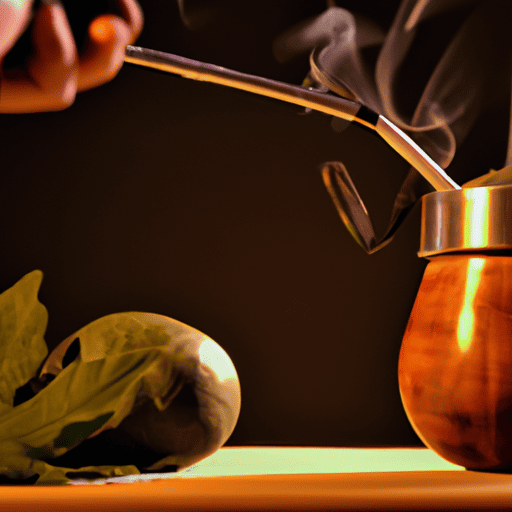
Key Takeaways
- Select loose leaf tea or tea bags for convenience and quality
- Follow recommended steeping times to avoid bitter or weak flavor
- Use faster cooling methods such as frozen tea cubes or cold brew method
- Experiment with flavor infusions like citrus fruits, mint leaves, and berries to enhance taste and health benefits
Selecting the Ideal Tea Type
I love selecting the ideal tea type for my iced tea recipe.
When it comes to making iced tea, there are two main options to consider: loose leaf tea and tea bags. Both options have their advantages, so it ultimately comes down to personal preference.
Loose leaf tea offers a higher quality and more nuanced flavor. It allows the tea leaves to fully expand and infuse the water, resulting in a more robust taste.
On the other hand, tea bags are convenient and easy to use. They’re pre-measured and can be steeped directly in hot water, making the brewing process quick and hassle-free.

Whether you choose loose leaf tea or tea bags, the most important factor is to select a high-quality tea that suits your taste preferences.
Brewing the Tea to Perfection
To brew the tea to perfection, add the hot water and tea leaves to the teapot, and let it steep for the recommended time.
Brewing techniques and steeping time are crucial factors in achieving the best taste and flavor from your tea. Different types of tea require different steeping times to bring out their unique qualities.
For example, green tea is typically steeped for 2-3 minutes, while black tea may need 3-5 minutes. Herbal teas, on the other hand, can be steeped for 5-7 minutes.
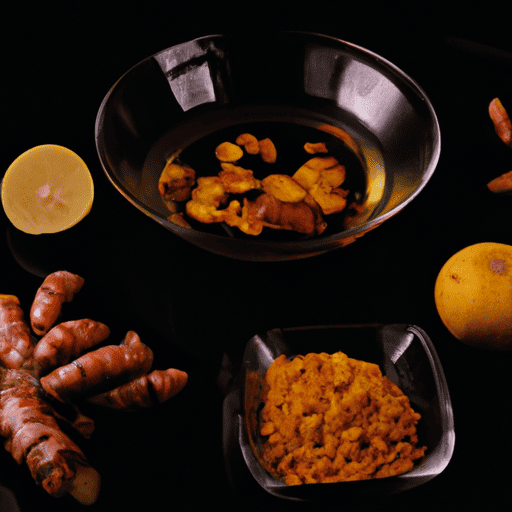
It’s important to follow the recommended steeping times to avoid over-extraction or under-extraction of the tea leaves, which can result in a bitter or weak flavor.
Cooling the Tea in the Refrigerator
I love making iced tea. One of the easiest ways to cool it down is by placing it in the refrigerator. The cold temperature helps to chill the tea quickly, making it ready to enjoy in no time.
Additionally, cooling the tea in the refrigerator allows for the infusion of flavors to develop further. This results in a more delicious and refreshing beverage.
Faster Cooling Methods
I can’t believe how quickly my iced tea is cooling in the refrigerator! It’s so refreshing to have a cold drink on a hot day. However, I recently discovered some faster cooling methods that I wanted to share with you. Here are five ways to cool your tea more efficiently:

-
Use frozen tea cubes: Instead of using regular ice cubes, freeze some brewed tea in an ice cube tray. When you add these tea cubes to your iced tea, it will cool down without diluting the flavor.
-
Try the cold brew method: Cold brewing tea involves steeping tea leaves in cold water for a longer period of time, usually overnight. This method produces a smoother and less bitter tea, perfect for iced tea.
-
Use a metal straw: Drinking your iced tea through a metal straw can help cool it down faster. Metal conducts heat, so it will absorb some of the heat from the tea as you sip.
-
Add a splash of cold water: If your tea is still too hot, adding a small amount of cold water can help speed up the cooling process.

-
Use a chilled glass: Before pouring your tea, place your glass in the freezer for a few minutes to chill it. This will help keep your tea colder for longer.
Flavor Infusion Options
I love experimenting with different flavor infusion options to enhance the taste of my iced tea while it’s chilling in the refrigerator. Customizing flavors is a fun and creative way to enjoy a refreshing beverage. When it comes to herbal teas, the benefits go beyond just taste. They are packed with antioxidants and have various health benefits. Here are some flavor infusion ideas to inspire you:
| Flavor | Added Ingredient | Benefits |
|---|---|---|
| Citrus | Lemon, Lime, Orange | Boosts immune system, aids digestion |
| Mint | Fresh mint leaves | Relieves indigestion, freshens breath |
| Berry | Strawberries, blueberries, raspberries | Rich in antioxidants, promotes heart health |
Incorporating different flavors not only adds a burst of taste but also introduces additional health benefits to your iced tea. Now, let’s explore how we can incorporate healthier sweeteners to make our drink even better.
Incorporating Healthier Sweeteners
When it comes to incorporating healthier sweeteners into my iced tea, I’ve found that natural alternatives are the way to go. Not only do they provide a touch of sweetness, but they also offer additional health benefits.

Natural Sweetener Alternatives
Using natural sweetener alternatives can help me create healthier iced tea without sacrificing taste. Here are some options to consider:
- Stevia: A zero-calorie sweetener extracted from the Stevia plant.
- Monk Fruit: A natural sweetener that contains antioxidants and has zero calories.
- Raw Honey: A healthier alternative to processed sugar, it contains vitamins and minerals.
- Coconut Sugar: Made from the sap of coconut palm trees, it has a lower glycemic index than regular sugar.
- Maple Syrup: A natural sweetener that provides essential minerals like manganese and zinc.
By using these healthy sweeteners, I can enjoy a refreshing glass of iced tea without the guilt.
It’s important to reduce sugar intake for overall health and weight management. Transitioning to natural sugar alternatives is a great step towards achieving this goal.
Reducing Sugar Intake
Cutting down on sugar intake by incorporating healthier sweeteners is a smart way to improve my overall health. Excessive sugar consumption has been linked to various health issues, such as obesity, type 2 diabetes, and heart disease. By reducing sugar intake, I can lower my risk of developing these conditions and maintain a healthier weight.

One way to achieve this is by finding suitable sugar alternatives. Stevia, for example, is a natural sweetener that has zero calories and doesn’t raise blood sugar levels. Another option is monk fruit extract, which is also calorie-free and doesn’t impact blood sugar. These alternatives can be used in various recipes, such as beverages, desserts, and baked goods, allowing me to enjoy sweet treats without the negative effects of sugar.
Adding Fresh Fruits for Enhanced Flavor
I love adding fresh fruits to my iced tea for an enhanced flavor experience. It not only makes my tea taste delicious but also adds a refreshing twist to it.
Here are some benefits of adding citrus fruits to herbal teas:
- Citrus fruits like lemons, limes, and oranges are rich in vitamin C, which boosts the immune system.
- They provide natural sweetness without the need for added sugars.
- Citrus fruits are also packed with antioxidants that help fight inflammation and protect against chronic diseases.
- The acidic nature of citrus fruits enhances the extraction of beneficial compounds from herbal teas.
- They add a bright and zesty flavor that complements the earthy and floral notes of herbal teas.
Opting for Decaffeinated Teas
Luckily, I can still enjoy the flavor and health benefits of herbal teas by opting for decaffeinated options. Decaffeinated tea offers a great alternative for those who love tea but want to reduce their caffeine intake.
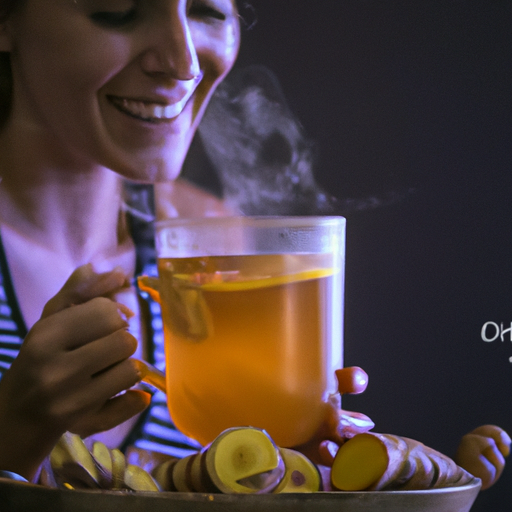
One of the benefits of decaffeinated tea is that it still retains many of the beneficial compounds found in regular tea, such as antioxidants and polyphenols. These compounds have been linked to various health benefits, including improved heart health and reduced risk of chronic diseases.
When it comes to decaffeinated tea options, there are plenty to choose from. Popular varieties include decaffeinated green tea, chamomile tea, and peppermint tea. These options provide a flavorful and soothing experience, without the stimulating effects of caffeine.
Establishing Correct Iced Tea Proportions
Using three tablespoons of tea leaves per quart of water is the key to establishing the correct proportions for making delicious iced tea. Iced tea is a refreshing and healthy beverage that can be enjoyed all year round.
Here are some benefits of iced tea and correct brewing techniques to ensure you make the perfect batch every time:
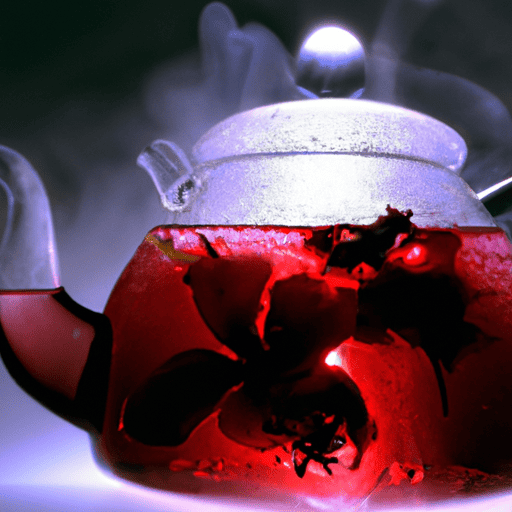
- Proper ratio: Use 3 tablespoons of tea leaves per quart of water.
- Steep time: Brew the tea for 3-5 minutes for optimal flavor extraction.
- Cooling method: Allow the tea to cool to room temperature before placing it in the refrigerator.
- Sweetening options: Add honey, agave syrup, or stevia for a natural and healthier alternative to sugar.
- Flavor variations: Experiment with different tea blends, such as green tea, herbal tea, or fruit-infused tea, to create unique and refreshing flavors.
Frequently Asked Questions
Can I Use Herbal Tea for Making Weight Loss Iced Tea?
Yes, you can use herbal tea for making weight loss iced tea. Herbal teas offer various benefits, such as boosting metabolism and reducing appetite. There are many herbal tea recipes available that can help with weight loss.
How Long Should I Steep the Tea for to Get the Best Flavor?
To get the best flavor, steep the tea for the recommended time according to the type of tea you’re using. Different tea varieties have unique brewing techniques that bring out their benefits and flavors.
Can I Use Honey as a Healthier Sweetener Option?
Yes, you can use honey as a healthier sweetener option. It adds a natural sweetness and has potential health benefits. Green tea is also a great choice for weight loss due to its metabolism-boosting properties.
Which Fruits Work Best for Adding Flavor to Iced Tea?
Adding fruits like lemon, berries, and peach can infuse iced tea with refreshing and natural flavors. These fruits not only enhance taste but also offer health benefits like antioxidants and vitamins, making weight loss iced tea both flavorful and nutritious.
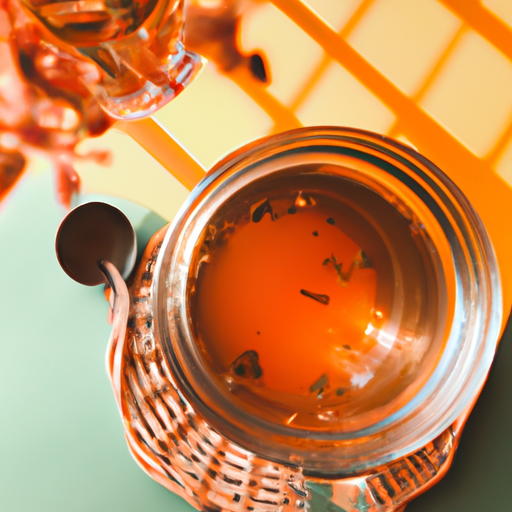
Is It Necessary to Use Decaffeinated Tea for Weight Loss Iced Tea?
No, it isn’t necessary to use decaffeinated tea for weight loss iced tea. There are plenty of caffeine-free alternatives that offer the same benefits. Decaffeinated tea can still be a good option though, as it provides additional health advantages.
Conclusion
So, there you have it! With these simple steps, you can become the master of creating healthy weight loss iced tea. Say goodbye to sugary drinks and hello to a refreshing and nutritious alternative.
Remember to choose the right tea, brew it perfectly, cool it down in the fridge, use healthier sweeteners, add fresh fruits for a burst of flavor, and opt for decaffeinated options.
By following these tips, you’ll be sipping on a delicious glass of weight loss iced tea in no time!

In the vast and diverse world of coffee, coffee alternatives, and tea, Olivia has found her calling. As an author and a dedicated coffee and tea aficionado, her work for Cappuccino Oracle reflects her profound love and understanding of the intricate complexities found within these beverages. Olivia’s passion for the subject serves as both a catalyst for her creativity and a connection point with her audience.
Olivia’s appreciation for coffee, coffee alternatives, and tea blossomed at an early age. She discovered that these beverages invigorated her senses and stimulated her creative spirit. From the nuanced flavors of single-origin roasts to the captivating narratives intertwined with coffee, coffee alternatives, and tea trade and culture, Olivia found an unlimited source of inspiration in her daily cup.
Her love for these beverages and her talent for storytelling eventually converged at Cappuccino Oracle. As an author, Olivia’s mission is to illuminate the intricate tapestry that makes up the world of coffee, coffee alternatives, and tea. Her articles span a diverse range of topics, encompassing everything from the unique flavors of different brews to the sociocultural history intertwined with their cultivation and consumption.
Turmeric Tea
How Long to Steep Green Tea for Kombucha

As someone who loves tea, I have found that the key to making the best kombucha is mastering the process of brewing green tea.
The right amount of time can make all the difference in unlocking the vibrant flavors and health benefits.
Join me on this journey as we delve into the world of steeping, exploring the factors that influence the process and uncovering the recommended steeping time for green tea in kombucha.
Get ready to sip your way to kombucha perfection!
Key Takeaways
- Steeping time is crucial for unlocking optimal flavors in green tea for kombucha.
- Different types of green tea require different steeping times.
- Steeping green tea in kombucha for 3-5 minutes is generally recommended to release flavors and antioxidants without excessive bitterness.
- Adjusting steeping time allows customization of the tea to personal taste, ranging from mild and subtle to bold and robust flavor profiles.
Understanding the Importance of Steeping Time
To achieve the best flavor and health benefits, you should steep your green tea for the recommended amount of time.
Steeping time is crucial when it comes to exploring optimal flavors in your tea. Different types of green tea require different steeping times to release their full potential.
Experimenting with different teas can be a fun and exciting way to discover your personal preferences. Some teas may need only a couple of minutes to steep, while others may require a longer steeping time.
It is important to follow the instructions provided by the tea manufacturer or use a general guideline for steeping time, usually ranging from 1 to 3 minutes.
Understanding the importance of steeping time will allow you to fully enjoy the flavors and health benefits of green tea.
Now, let’s delve into the factors that influence steeping time.
Factors That Influence Steeping Time
Factors such as water temperature, tea quality, and personal preference can affect how long you should let the leaves steep. The brewing techniques used, along with these factors, play a crucial role in flavor extraction.
Water temperature is key, as different types of tea require specific temperatures to bring out their optimal flavors. For green tea, a lower temperature of around 175°F is recommended to prevent bitterness.
Additionally, the quality of the tea leaves can impact the steeping time. Higher quality leaves often require less time to extract their flavors fully.
Lastly, personal preference plays a significant role. Some individuals may prefer a stronger, more robust flavor and may choose to steep the tea for a longer duration.
Now, let’s dive into the recommended steeping time for green tea in kombucha.
Recommended Steeping Time for Green Tea in Kombucha
The ideal amount of time to let the leaves infuse in this fermented beverage can vary depending on personal taste preferences and the desired strength of flavor. When it comes to green tea in kombucha, the recommended steeping time is generally around 3-5 minutes. This allows the tea to release its flavors and antioxidants without becoming too bitter. Green tea is a popular choice for kombucha due to its numerous health benefits. It is rich in antioxidants, which help to reduce inflammation and boost the immune system. Additionally, green tea contains a compound called EGCG, which has been shown to have anti-cancer properties. By steeping green tea for the recommended amount of time, you can ensure that your kombucha has a balanced and refreshing taste, while also reaping the benefits of this powerful tea.
| Steeping Time | Flavor Profile |
|---|---|
| 3 minutes | Light and delicate |
| 4 minutes | Balanced and smooth |
| 5 minutes | Robust and full-bodied |
Oversteeping Vs. Understeeping: Finding the Sweet Spot
Finding the perfect balance of flavor when steeping your tea is crucial. Oversteeping or understeeping can greatly impact the taste of your beverage.
Oversteeping can lead to a bitter and astringent flavor that overwhelms the delicate notes of the tea. This happens because the longer the tea leaves steep, the more tannins are released, resulting in a harsh taste.
On the other hand, understeeping can leave your tea tasting weak and lacking in depth. The flavors and aromas may not fully develop, leaving you with a bland and unsatisfying cup.
It’s important to follow the recommended steeping times for different types of tea to achieve the desired flavor profile. By finding the sweet spot, you can ensure a perfectly balanced and enjoyable tea experience.
Adjusting Steeping Time for Personal Preference
To customize your tea to your taste, experiment with adjusting the steeping time to find the perfect balance of flavor. When it comes to green tea for kombucha, the steeping time can greatly impact the taste and quality of your brew. Adjusting the steeping time allows you to control the strength and intensity of the flavor, whether you prefer a mild and subtle taste or a bolder and more robust flavor profile. Experimenting with different steeping times is the key to finding your preferred taste. To help you get started, here is a table outlining the general guidelines for steeping green tea for kombucha:
| Steeping Time | Flavor Profile |
|---|---|
| 1-2 minutes | Light and delicate |
| 2-3 minutes | Balanced and smooth |
| 3-4 minutes | Full-bodied and bold |
| 4-5 minutes | Strong and robust |
| 5+ minutes | Bitter and astringent |
Conclusion
In conclusion, steeping green tea for kombucha is a delicate art that requires precision and attention to detail. By understanding the importance of steeping time and the factors that influence it, you can achieve the perfect balance of flavors in your brew.
Whether it’s the refreshing taste of a lightly steeped tea or the boldness of a longer steep, finding the sweet spot is key. So, experiment with different steeping times and adjust to your personal preference, creating a symphony of flavors that dances on your taste buds.
Noah, the Editor-in-Chief at Cappuccino Oracle, plays a pivotal role in shaping the voice and vision of our renowned platform. With an unwavering passion for coffee, coffee alternatives, and tea, Noah leads Cappuccino Oracle towards new horizons in the realm of coffee journalism.
Beyond his professional responsibilities, Noah serves as a mentor and guiding force for his team. His dedication to journalistic excellence and genuine love for coffee, coffee alternatives, and tea continue to inspire and motivate the Cappuccino Oracle family. In the ever-evolving world of these beverages, Noah’s leadership ensures that our platform remains at the forefront, delivering enlightening and enjoyable content to our readers worldwide.
Turmeric Tea
What Is the Benefits of Kombucha Tea

Were you aware that kombucha tea has been enjoyed for centuries because of its numerous health advantages?
In fact, studies have shown that this fermented beverage can improve digestion, boost the immune system, aid in weight management, and even support detoxification.
As someone who values holistic wellness, I am excited to share with you the evidence-based benefits of kombucha tea.
So, grab a glass and join me on this journey to discover the incredible advantages of this ancient elixir.
Key Takeaways
- Kombucha tea improves digestion.
- It boosts the immune system.
- Kombucha tea aids in weight management.
- It supports detoxification.
Health Benefits of Kombucha Tea
You’ll love the health benefits of kombucha tea, such as improved digestion and increased immune function.
But did you know that kombucha tea can also have positive effects on your skin health and mental wellness?
Kombucha tea contains beneficial acids, vitamins, and antioxidants that can promote a healthy complexion and reduce the signs of aging. It can also help improve the overall texture and tone of your skin.
As for mental wellness, kombucha tea is rich in B vitamins, which are essential for brain health and can help improve mood and reduce stress. Additionally, the probiotics in kombucha tea can support a healthy gut-brain connection, which is important for mental well-being.
With its numerous health benefits, kombucha tea is truly a holistic beverage that can enhance not only your physical health but also your skin and mental well-being.
Now, let’s explore how kombucha tea can boost digestive health even further.
Boosting Digestive Health With Kombucha Tea
Boosting digestive health can be achieved with the consumption of kombucha tea. Kombucha is a fermented tea that is rich in probiotics, which are beneficial bacteria that support gut health. These probiotics help to balance the bacteria in your digestive system, promoting optimal digestion and nutrient absorption.
The live cultures in kombucha tea can also help to improve the function of your gut by reducing inflammation and enhancing the production of enzymes that aid in the breakdown of food. Additionally, kombucha tea contains organic acids that can support the growth of good bacteria in your gut and inhibit the growth of harmful bacteria.
Kombucha Tea and Its Impact on Immune System
Drinking kombucha can improve your immune system by supporting the growth of beneficial bacteria in the gut. The immune system plays a crucial role in protecting our bodies from infections and diseases. Research suggests that the gut microbiota, which consists of trillions of bacteria, fungi, and other microbes, plays a significant role in immune system support.
Kombucha, a fermented tea, contains probiotics that can help enhance the diversity and balance of the gut microbiota. This can lead to a stronger immune response and potentially reduce the risk of allergies. Studies have shown that probiotics found in kombucha can modulate the immune system and help alleviate symptoms of allergies.
So, incorporating kombucha into your diet may have beneficial effects on your immune system and overall health.
Speaking of health benefits, let’s explore how kombucha tea can aid in weight management.
Weight Management and Kombucha Tea
Incorporating kombucha into your diet can help with weight management by promoting a healthy metabolism and supporting a balanced gut microbiota. Here are four ways that kombucha tea can benefit your weight management journey:
-
Boosts metabolism: Kombucha contains organic acids and enzymes that can help increase your metabolic rate, allowing your body to burn calories more efficiently.
-
Supports gut health: The probiotics found in kombucha can help restore and maintain a healthy balance of bacteria in your gut. This is important for weight management as an imbalanced gut microbiota has been linked to weight gain and obesity.
-
Reduces cravings: Kombucha can help curb your cravings for sugary and unhealthy foods. Its tangy and slightly sweet taste can satisfy your taste buds and prevent you from reaching for unhealthy snacks.
-
Provides hydration: Staying hydrated is essential for weight management, and kombucha can be a refreshing and hydrating beverage option.
The Role of Kombucha Tea in Detoxification
Detoxification can be supported by incorporating kombucha into your diet, as it aids in promoting a healthy gut microbiota. Kombucha tea is known for its numerous health benefits, including its ability to support liver function. The liver plays a vital role in detoxification, as it helps remove toxins from the body.
Kombucha tea contains beneficial acids and antioxidants that can help protect the liver and support its detoxification processes. Additionally, kombucha tea has been found to have positive effects on skin health. The antioxidants and probiotics present in kombucha can help improve skin elasticity and reduce the appearance of wrinkles.
Incorporating kombucha tea into your daily routine can be a great way to support your body’s natural detoxification processes and promote overall health and well-being.
Conclusion
In conclusion, the benefits of kombucha tea are numerous and can greatly contribute to our overall health and well-being.
With its ability to boost digestive health, strengthen the immune system, aid in weight management, and support detoxification, kombucha tea is a powerful elixir.
One interesting statistic to highlight is that kombucha tea contains probiotics, which are beneficial bacteria that can improve gut health. In fact, a single serving of kombucha tea can contain billions of these probiotics, promoting a healthy digestive system.
Incorporating kombucha tea into our daily routine can have a profound impact on our health.
Noah, the Editor-in-Chief at Cappuccino Oracle, plays a pivotal role in shaping the voice and vision of our renowned platform. With an unwavering passion for coffee, coffee alternatives, and tea, Noah leads Cappuccino Oracle towards new horizons in the realm of coffee journalism.
Beyond his professional responsibilities, Noah serves as a mentor and guiding force for his team. His dedication to journalistic excellence and genuine love for coffee, coffee alternatives, and tea continue to inspire and motivate the Cappuccino Oracle family. In the ever-evolving world of these beverages, Noah’s leadership ensures that our platform remains at the forefront, delivering enlightening and enjoyable content to our readers worldwide.
Turmeric Tea
How Much Tea per Quart Kombucha
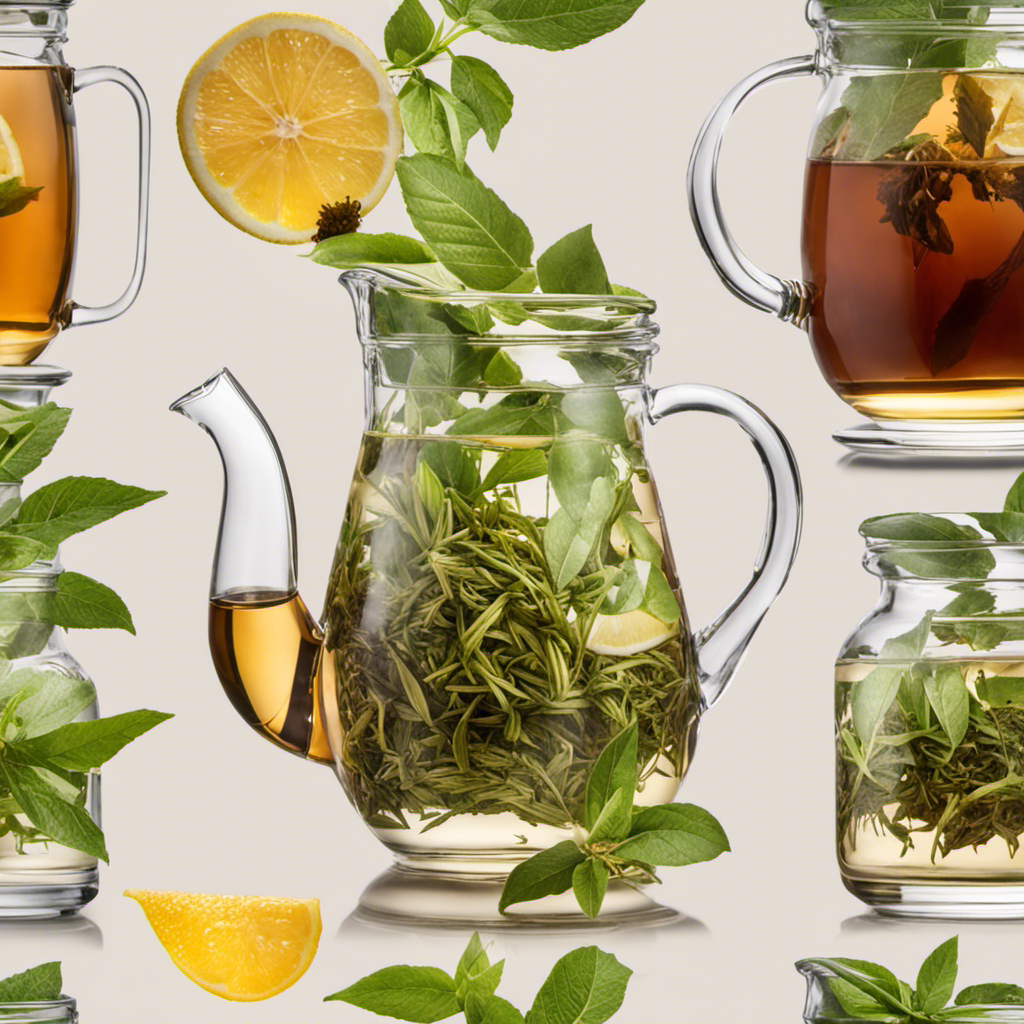
As an enthusiastic kombucha maker, I have always been intrigued by the process of crafting the ideal brew. Just like a conductor guiding an orchestra, the quantity of tea we incorporate in our kombucha is essential in attaining that perfect blend of flavors.
In this article, we’ll explore the ideal tea-to-water ratio for optimal kombucha taste, as well as how different tea varieties can influence the fermentation process. Get ready to dive into the world of tea and discover just how much tea should go into your quart of kombucha.
Key Takeaways
- Black tea and green tea are commonly used as the base for kombucha due to their high caffeine content.
- Herbal teas like hibiscus, chamomile, and peppermint can be used for a caffeine-free option or to add unique flavors.
- The ideal tea-to-water ratio for optimal kombucha flavor is one tablespoon of loose tea leaves per quart of water.
- Adjusting the amount of loose tea leaves used can control the intensity and strength of the kombucha flavor.
Types of Tea for Brewing Kombucha
There’s a wide variety of tea options for brewing kombucha. When it comes to choosing the right tea, it’s important to consider both the caffeine content and the flavor variations that herbal teas can offer.
Teas with high caffeine content, such as black tea or green tea, are commonly used as the base for kombucha. The caffeine helps to provide a vital energy boost during fermentation. However, if you prefer a caffeine-free option or want to experiment with different flavors, herbal teas can be a great choice. Popular herbal teas for brewing kombucha include hibiscus, chamomile, and peppermint. These teas can add a unique twist to your kombucha, creating a delicious and refreshing beverage.
Now that we’ve explored the different types of tea, let’s move on to discussing the tea-to-water ratio for optimal kombucha flavor.
Tea-to-Water Ratio for Optimal Kombucha Flavor
For the best flavor, it’s important to use the right ratio of tea to water when making kombucha. The ideal ratio is one tablespoon of loose tea leaves per quart of water. This ensures that the tea flavor is not too overpowering or diluted.
When it comes to brewing time, different types of tea require varying steeping times in kombucha. Black tea, which is commonly used in kombucha, should be steeped for 15 minutes. Green tea, on the other hand, only needs 10 minutes. Herbal teas, such as chamomile or mint, should be steeped for 5 minutes to retain their delicate flavors.
Using flavored teas in kombucha fermentation can add interesting and unique flavors to your brew. However, it’s important to note that some flavored teas may contain additives or oils that can negatively impact the fermentation process. It’s best to opt for natural flavored teas or add flavorings during the second fermentation stage.
Adjusting Tea Amounts for Stronger or Weaker Kombucha
To make your kombucha stronger or weaker, you can adjust the amount of loose tea leaves used in the brewing process. By varying the quantity of tea, you can control the intensity of the flavor and the overall strength of your kombucha.
When it comes to tea brewing techniques for a more robust kombucha flavor, using more tea leaves in relation to the amount of water will result in a stronger brew. Conversely, reducing the amount of tea will yield a milder taste.
Experimenting with different tea blends is another way to create unique kombucha taste profiles. Each tea variety brings its own distinct flavors and characteristics to the brew.
In the subsequent section, we will discuss how different tea varieties affect kombucha fermentation, further exploring the relationship between tea and the fermentation process.
How Different Tea Varieties Affect Kombucha Fermentation
Try experimenting with various tea varieties to see how they impact the fermentation process of your kombucha. Different types of tea can have a significant impact on the flavor and overall quality of your brew. Here are a few key points to consider:
-
Tea quality and its impact on kombucha fermentation:
-
High-quality loose-leaf teas often yield better results than tea bags.
-
Organic teas are preferable to avoid any potential chemical residues.
-
Different tea regions and cultivars can result in unique flavor profiles.
-
Exploring the role of caffeine in kombucha fermentation:
-
Caffeine acts as a source of food for the kombucha culture.
-
Teas with higher caffeine content may result in faster fermentation.
-
However, excessive caffeine can potentially harm the culture.
Factors to Consider When Determining Tea Quantity for Kombucha
When determining the quantity of tea for your kombucha, consider using a ratio of 1 cup of loose-leaf tea for every gallon of water. This ratio ensures a well-balanced flavor and optimal fermentation.
There are several factors to consider when determining the tea quantity for your kombucha. The first factor is the strength of the tea. If you prefer a stronger brew, you may want to increase the amount of tea used.
Another factor to consider is the brewing time. The longer the tea is brewed, the stronger the flavor will be.
Additionally, the type of tea used can affect the fermentation process. It is important to use organic tea as it ensures that no unwanted chemicals or pesticides are present, which can hinder the fermentation process. Using organic tea also enhances the overall taste and quality of your kombucha.
Frequently Asked Questions
Can I Use Herbal Tea to Brew Kombucha?
Yes, herbal tea can be used to brew kombucha. It adds unique flavors and benefits to the final product. However, it’s important to note that some herbal teas may not provide enough nutrients for the SCOBY, so a combination with black or green tea is recommended.
What Is the Ideal Brewing Time for Black Tea Kombucha?
The ideal brewing time for black tea kombucha depends on personal preference. Generally, 7-10 days at room temperature is recommended. Caffeine in black tea provides nutrients for the SCOBY during fermentation.
Can I Use Loose Leaf Tea Instead of Tea Bags for Making Kombucha?
Using loose leaf tea instead of tea bags for making kombucha can result in a richer and more complex flavor profile. However, there are potential drawbacks such as increased sediment and the need for straining.
How Does Using Green Tea Affect the Fermentation Process of Kombucha?
Using green tea in kombucha fermentation provides additional health benefits due to its high antioxidant content. However, other tea options like black or oolong can also be used depending on personal preference and desired flavor profile.
Are There Any Health Benefits Associated With Using Specific Types of Tea for Brewing Kombucha?
There are various health benefits associated with using different types of tea for brewing kombucha. Each tea imparts its unique flavor profile, which can range from floral to earthy or even fruity.
Conclusion
In conclusion, determining the right amount of tea for a quart of kombucha is crucial for achieving the perfect flavor. By following the recommended tea-to-water ratio, you can ensure optimal taste and fermentation.
However, it’s important to note that different tea varieties can affect the fermentation process differently, so adjustments may be needed.
Just like a skilled conductor harmonizes an orchestra, finding the right balance of tea in your kombucha is like creating a symphony of flavors that will leave your taste buds dancing with delight.
Arf, an author and an innovative enthusiast of coffee, coffee alternatives, and tea, plays a crucial role as a contributor to the esteemed Cappuccino Oracle platform. Renowned for his curiosity and passion for these captivating beverages, Arf has carved out a unique space for himself in the world of exploration and writing. He realized that coffee, coffee alternatives, and tea are not mere drinks to keep one awake, but universes of flavors and stories waiting to be explored.
Arf’s articles for Cappuccino Oracle blend meticulous research with personal experiences, providing readers with an in-depth understanding of various types of coffee, coffee alternatives, and tea, along with their unique characteristics, cultures, and histories. His honest reviews and engaging narratives guide readers on their own journeys, helping them discover their preferences and find their perfect brew.
-

 Americano4 weeks ago
Americano4 weeks agoHow to Make Americano With Moka Pot
-

 Americano2 weeks ago
Americano2 weeks agoHow to Make Korean Iced Americano
-

 Americano4 weeks ago
Americano4 weeks agoHow to Make Americano With Bialetti
-

 Americano4 weeks ago
Americano4 weeks agoHow to Make Dutch Bros Americano
-

 Americano1 week ago
Americano1 week agoHow to Make an Iced Americano With Nespresso
-

 Americano2 weeks ago
Americano2 weeks agoHow Many Shots of Espresso for 16 Oz Americano
-

 Americano4 weeks ago
Americano4 weeks agoHow to Make a Hazelnut Americano
-

 Turmeric Tea1 week ago
Turmeric Tea1 week agoTurmeric Saffron Tea









